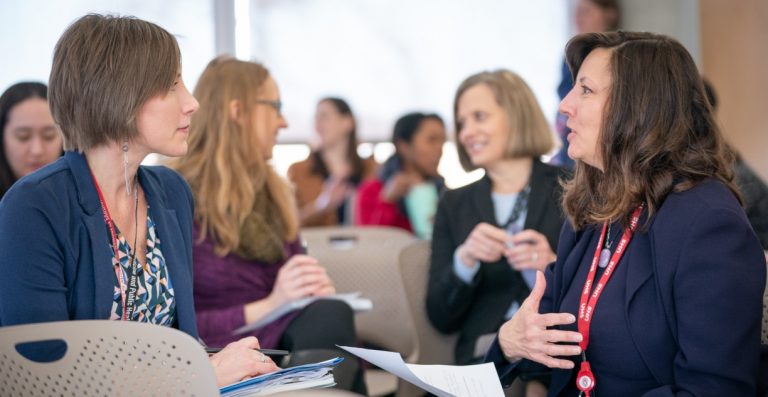The Wisconsin Update in Geriatric Medicine (WUGM) conference focuses on interprofessional collaboration and team-based care to deliver the latest information on age-related health issues and to support healthy aging.
It is designed for clinicians who work with older adults, including, but not limited to: physicians, physician assistants, nurses and nurse practitioners, pharmacists, psychologists, social workers and interprofessional trainees. All are welcome.
WUGM is jointly provided by Medical College of Wisconsin and the University of Wisconsin–Madison Interprofessional Continuing Education Partnership (ICEP)
Course Objectives:
Over this four day, hybrid conference, speakers from an array of backgrounds and specialties will promote collaboration, explore the dynamics of team-based care and apply the Geriatrics 5Ms framework to the care of geriatric patients.
Multicomplexity:
- Describe the operation of long-term care systems and specialized geriatric assessment programs for geriatric patients.
- Provide updates on key geriatric syndromes (e.g., urinary incontinence, metabolic bone disease, dementia, and falls).
- Outline clinical pearls that can be applied to the care of geriatric patients across various settings: hospital, post-acute and long term care, home-based care, rural and urban.
- Apply knowledge of age-related physiological changes in geriatric patients as they relate to the management of common chronic diseases.
Medications:
- Discuss appropriate pharmacologic and non-pharmacologic treatments for geriatric patients.
- Identify pharmacokinetic/pharmacodynamic changes that affect medication prescribing.
Mentation:
- Explain the principles of preventative medicine, ethics, rehabilitation, and psychiatry with a focus on the holistic, whole-person approach of the geriatric patient.
- Describe the benefits, potential risks, and logistical considerations of administering the newest treatments for Alzheimer’s Disease.
Matters Most:
- Describe the importance of determining “what matters most” with a geriatric patient.
- Discuss palliative care and advance care planning.
Course Directors:
Elizabeth Chapman, MD
Clinical Associate Professor, Division of Geriatrics and Gerontology
University of Wisconsin School of Medicine and Public Health
Steven Denson, MD
Associate Professor, Geriatric and Palliative Medicine
Medical College of Wisconsin
Stay Connected with WUGM
Join our mailing list to receive updates, announcements, and program information from the Wisconsin Update in Geriatric Medicine. Request to join here.
Accreditation and CME Information
The following accreditation and credit designation statements applied to Wisconsin Update in Geriatric Medicine (WUGM) 2025. Continuing Medical Education (CME) details for WUGM 2027 will be announced closer to the conference date.
Accreditation Statement
 |
In support of improving patient care, this activity was planned and implemented by the University of Wisconsin–Madison Interprofessional Continuing Education Partnership (ICEP) and the Medical College of Wisconsin. The University of Wisconsin–Madison ICEP is jointly accredited by the Accreditation Council for Continuing Medical Education (ACCME), the Accreditation Council for Pharmacy Education (ACPE), and the American Nurses Credentialing Center (ANCC) to provide continuing education for the healthcare team. |
Credit Designation Statements
| American Medical Association (AMA) | The University of Wisconsin–Madison ICEP designated this live activity for a maximum of 26.75 AMA PRA Category 1 Credits™. Physicians should claim only the credit commensurate with the extent of their participation in the activity. |
| American Academy of Family Physicians (AAFP) | The AAFP reviewed WUGM 2025 and deemed it acceptable for up to 26.75 Live AAFP Prescribed credits (09/08/2025–09/11/2025).
|
| Accreditation Council for Pharmacy Education (ACPE) | The University of Wisconsin–Madison ICEP designates this knowledge-based activity for a maximum of 26.75 hours/2.675 CEUs of CPE credit. Credit can be earned by documented attendance and by successfully completing the evaluation. Credit will be provided to NABP CPE Monitor within 60 days after the activity completion. UAN #JA0000358-9999-25-038-L99-P |
| American Nurses Credentialing Center (ANCC) | The University of Wisconsin–Madison ICEP designates this live activity for a maximum of 26.75 ANCC contact hours (4.5 of which are eligible for pharmacotherapeutic contact hours). |
| Association of Social Work Boards (ASWB) | As a Jointly Accredited Organization, the University of Wisconsin–Madison ICEP is approved to offer social work continuing education by the Association of Social Work Boards (ASWB) Approved Continuing Education (ACE) program. Organizations, not individual courses, are approved under this program. Regulatory boards are the final authority on courses accepted for continuing education credit. Social workers completing this course receive 26.75 general live continuing education credits. |
| American Academy of Physician Assistants (AAPA) | The University of Wisconsin–Madison ICEP has been authorized by the American Academy of PAs (AAPA) to award AAPA Category 1 CME credit for activities planned in accordance with AAPA CME Criteria. This activity is designated for 26.75 AAPA Category 1 CME credits. PAs should only claim credit commensurate with the extent of their participation. |
| American Psychological Association (APA) | Continuing Education (CE) credits for psychologists are provided through the co-sponsorship of the American Psychological Association (APA) Office of Continuing Education in Psychology (CEP). The APA CEP Office maintains responsibility for the content of the programs. |
| Continuing Education Units (CEUs) | The University of Wisconsin–Madison ICEP, as a member of the University Professional & Continuing Education Association (UPCEA), authorizes this program for 2.675 CEUs or 26.75 hours. |

